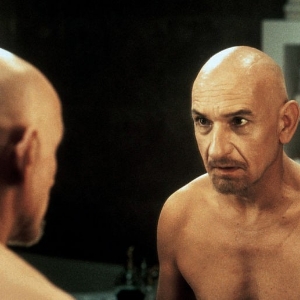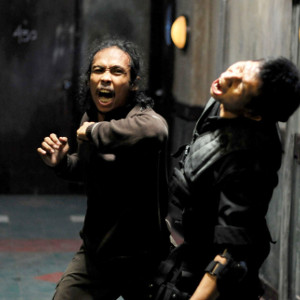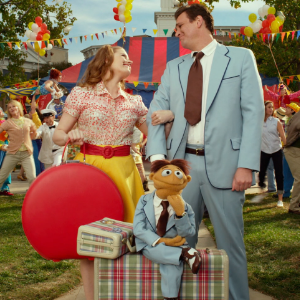
Birth (2004)
Cast: Nicole Kidman, Cameron Bright, Lauren Bacall
Director: Jonathan Glazer
Country: USA | UK | Germany
Genre: Drama | Mystery | Romance | Thriller
Official Trailer: Here
Editor’s Notes: Under the Skin opens tomorrow, April 4th.
 About one-third of the way through Jonathan Glazer’s Birth comes its narrative and stylistic turning point: for a nearly three-minute unbroken long take, protagonist Anna (Nicole Kidman) gradually realizes that she believes in ten-year-old Sean’s (Cameron Bright) claim that he is her husband reincarnated. Having tardily made her way into a packed concert hall with her new fiance (Danny Huston) after Sean’s adamant refusal to recant his story, Anna stares past the camera as Wagner swells on the soundtrack, representing the roiling emotional turmoil beneath her placid, fragile gaze. That single shot — audacious, severe, just as aural as visual, and entirely reliant on Kidman’s focused, interiorized performance — encapsulates the film’s overall strengths and weaknesses. Engaging yet self-consciously bravura, the oppressive zoom frames the lead actress’s face and lets duration and minute gesture relay what meaning it contains. It’s a moment that may try one viewer’s patience while piquing another one’s, becoming emblematic of the film as a whole.
About one-third of the way through Jonathan Glazer’s Birth comes its narrative and stylistic turning point: for a nearly three-minute unbroken long take, protagonist Anna (Nicole Kidman) gradually realizes that she believes in ten-year-old Sean’s (Cameron Bright) claim that he is her husband reincarnated. Having tardily made her way into a packed concert hall with her new fiance (Danny Huston) after Sean’s adamant refusal to recant his story, Anna stares past the camera as Wagner swells on the soundtrack, representing the roiling emotional turmoil beneath her placid, fragile gaze. That single shot — audacious, severe, just as aural as visual, and entirely reliant on Kidman’s focused, interiorized performance — encapsulates the film’s overall strengths and weaknesses. Engaging yet self-consciously bravura, the oppressive zoom frames the lead actress’s face and lets duration and minute gesture relay what meaning it contains. It’s a moment that may try one viewer’s patience while piquing another one’s, becoming emblematic of the film as a whole.
Birth opens in a similarly daring fashion. Seen from an above and behind, god’s-eye-view vantage point, the older Sean (Michael Desautels) jogs in Central Park while his voice-over baldly lays out the central narrative conceit. Already one of the film’s possible liabilities becomes evident, namely its excessive stylistic borrowings from previous films. Along with David Fincher and latter-day Paul Thomas Anderson, co-writer/director Glazer is one of the foremost wannabe heirs to Stanley Kubrick’s cinematic throne, trying to recapture that potent mix of formal precision and stringent objectivity found in such films as 2001: A Space Odyssey, whose rotating exerciser is a clear antecedent to this movie’s opening image. Following Sean’s collapse and death at the mouth of a tunnel along his jogging path, the narrative reemerges ten years later in a domestic setting of cramped interiors reminiscent of both The Shining and Rosemary’s Baby. Roman Polanski’s familial horror story is not only the obvious origin for Kidman’s notoriously short hairdo but also provides a model of claustrophobic, vaguely supernatural atmosphere achieved sans special effects or gory violence. Other homages too obvious to ignore include the shot following young Sean through school à la Danny Torrance in the hallways of the Overlook in The Shining and Anna’s future husband giving his best “Kubrick stare” through a window. Rich, inky shadows in the enveloping camera work of the late cinematographer Harris Savides make the strongest contributions to ambiance beyond the otherwise generically familiar visuals. While distracting, such recognizable moments could be easily forgiven if this style didn’t so overwhelm the rather straightforward storyline, and so Birth struggles to transcend being a mere game of “spot-the-influences.”
What a viewer is ultimately left with is what young Sean says and how Anna reacts, and little more.
In a nod to Kubrick that more fully pays off, Eyes Wide Shut‘s Nicole Kidman gives her deepest and most fully-embodied performance since Kubrick’s swan song. She carries the movie on her tense expressions and harried, guarded reactions to young Sean’s claims. Her entire metaphysical world is turned upside-down by the possibility of Sean still existing, but that whole relationship has nowhere else to be expressed but in Anna’s demeanor. The film’s first lines of dialogue constitute the only time Anna’s husband unambiguously speaks for himself, and they still prove redundant in light of a statement by Anna’s skeptical brother-in-law (Arliss Howard, coincidentally another Kubrick alum) reiterating older Sean’s feelings about spiritual matters while quizzing young Sean on tape. Sean is a ghostly absence in both physical and narrative terms. The decision to leave out this undoubtedly emotionally-resonant back story and rely instead on the actress’s skill and young Sean’s eerie pronouncements are challenges Kidman and Bright face with aplomb but, with a more fully fleshed-out story, probably needn’t have been burdened with at all.
 By 2004, Cameron Bright had already been in several high-profile films, and Birth‘s intriguing plot and controversial moments of intimacy gained him wider exposure. Although not entirely a zero-sum game, the film does grant Kidman’s Anna the stronger moments of emotional deliberation, rendering Sean more of a blank slate. He’s not often seen alone, nor is there much of a sense of an interior life for a character caught in such an existentially unique situation. He does seem preternaturally self-aware and queasily forward for his age, but a compelling exploration of his perspective never emerges. Such usually unpredictable and compelling actors as Anne Heche, Peter Stormare, and Lauren Bacall are clamped down in relation to the leads. What a viewer is ultimately left with is what young Sean says and how Anna reacts, and little more; whether what results is the possibility of love beyond earthly existence or an uncomfortable pair of delusions is up to the viewer to decide, leaving the film as irresolute and frustrating as a Rorschach test.
By 2004, Cameron Bright had already been in several high-profile films, and Birth‘s intriguing plot and controversial moments of intimacy gained him wider exposure. Although not entirely a zero-sum game, the film does grant Kidman’s Anna the stronger moments of emotional deliberation, rendering Sean more of a blank slate. He’s not often seen alone, nor is there much of a sense of an interior life for a character caught in such an existentially unique situation. He does seem preternaturally self-aware and queasily forward for his age, but a compelling exploration of his perspective never emerges. Such usually unpredictable and compelling actors as Anne Heche, Peter Stormare, and Lauren Bacall are clamped down in relation to the leads. What a viewer is ultimately left with is what young Sean says and how Anna reacts, and little more; whether what results is the possibility of love beyond earthly existence or an uncomfortable pair of delusions is up to the viewer to decide, leaving the film as irresolute and frustrating as a Rorschach test.
One of Birth‘s co-screenwriters (along with Glazer and Milo Addica) is Jean-Claude Carrière, noted French collaborator of Luis Buñuel, Pierre Étaix, and Jacques Tati. His input undoubtedly influenced the surreal but clear-eyed and darkly humorous implications of, and reactions of other characters to, Sean’s presence, amplified by the borderline whimsical aspects of Alexandre Desplat‘s otherwise unnerving score. Yet the last act’s hedge-betting at an ambiguous rational explanation lacks Carrière’s uncompromising fingerprints. More of his trust in the worldly and in the irrational, and fewer derivative stylistic touches, could have elevated the slight but suggestive material.
[notification type=”star”]53/100 ~ MEDIOCRE. Caught between being a paranormal drama and an edgy fairy tale, Birth lets its effective production design and icy, Kubrickian visual style overcome the emotional potential in Kidman’s superlative turn.[/notification]




Pingback: http://frivlatino.com/profile/artsever940()
Pingback: banheira()
Pingback: great deals()
Pingback: porno()
Pingback: browse around this site()
Pingback: Wade Hollack()
Pingback: Best buy cell phone accessories()
Pingback: Flyers()
Pingback: bikinis()
Pingback: movie2k()
Pingback: stained concrete()
Pingback: stained concrete()
Pingback: foundation repair()
Pingback: email verifier()
Pingback: short film()
Pingback: Acencarbonfiber()
Pingback: puppy playpen()
Pingback: plumbing repair()
Pingback: Employment lawyers()
Pingback: licensed master plumber()
Pingback: critical appraisal course()
Pingback: cheap snowmobile helmets()
Pingback: garcinia cambogia clinical studies()
Pingback: Silkscreen()
Pingback: Laser hair removal nyc()
Pingback: dog grooming()
Pingback: dog grooming()
Pingback: wheelchair transportation()
Pingback: How To Sell My House Without a Realtor San Antonio Texas Area()
Pingback: Learn More Here()
Pingback: trina nude app()
Pingback: click here()
Pingback: best promo codes for papa johns()
Pingback: best restaurant birmingham()
Pingback: biggest dicks in porn development()
Pingback: 50c()
Pingback: Massage austin()
Pingback: at here()
Pingback: sacred 3 trainer()
Pingback: opzioni binarie opinioni()
Pingback: royalclub()
Pingback: Massage Sway - Austin Day Spa()
Pingback: th8 war base()
Pingback: window tint austin()
Pingback: eyebrow tweeze()
Pingback: vitamin c serum()
Pingback: Best Affiliate Marketing Programs()
Pingback: fifthavenue()
Pingback: Hip Hop Music()
Pingback: Tai Lopez 67 Steps()
Pingback: Top()
Pingback: th8 war base anti hog anti dragon()
Pingback: shopify drop shipping()
Pingback: ceyda erem()
Pingback: TechSmith()
Pingback: wedding guitarist()
Pingback: pulau komodo tour()
Pingback: hack hungry shark()
Pingback: pest control cibolo tx()
Pingback: sped-up()
Pingback: guitar picks()
Pingback: Drawing For Kids()
Pingback: groupon()
Pingback: second hand clothes wholesale()
Pingback: logo design melbourne()
Pingback: Pittsburgh Plumbing()
Pingback: Yoga()
Pingback: Download Zombie Killer for Free()
Pingback: agencia publicidad malaga()
Pingback: publisher()
Pingback: Movers San Jose()
Pingback: Local Movers San Francisco()
Pingback: Kati()
Pingback: Entertainment()
Pingback: sell house fast()
Pingback: Co2 Reactor()
Pingback: adult realistic dinosaur costume()
Pingback: Law Of Devotion()
Pingback: YouTube Marketing()
Pingback: Designing a website()
Pingback: How To Tell Someone You Love Them()
Pingback: News Magazine()
Pingback: Skits()
Pingback: Playdoh()
Pingback: movietube()
Pingback: knockoffs purses()
Pingback: php upload file()
Pingback: garcinia cambogia 50 hca()
Pingback: Paket tour bali dari batam()
Pingback: white kidney bean extract phase 2 reviews()
Pingback: GPS Tracker()
Pingback: Surveys for Money()
Pingback: Dr Field Harrison()
Pingback: Signature Bail Bonds of Tulsa()
Pingback: Shea()
Pingback: test banks()
Pingback: ios 9.2.1 jailbreak()
Pingback: Email blast()
Pingback: diet()
Pingback: Complete Instamate Review()
Pingback: IT Support Ocala FL()
Pingback: diabetes review()
Pingback: There Is No Business To Be Done On A Dead Planet guitar cover()
Pingback: cold room doors()
Pingback: Motor Club of America()
Pingback: serviporno()
Pingback: hcg injections()
Pingback: official upc codes()
Pingback: Cash 4 Clothes()
Pingback: Aesthetics()
Pingback: punta cana visa()
Pingback: no anchor links please()
Pingback: REGALOS PARA BODA()
Pingback: night club seen life()
Pingback: Top List()
Pingback: العاب فلاش()
Pingback: tenerife property()
Pingback: landscape design Canberra()
Pingback: Shanel()
Pingback: SEO in 2016()
Pingback: SalesEnvy Bonus()
Pingback: Shane()
Pingback: http://rosengard.tv()
Pingback: australias most unreliable bank()
Pingback: cerrajeros paterna 24 horas()
Pingback: http://zombiediary2hackandcheats.com/()
Pingback: cat sitter()
Pingback: Homepage()
Pingback: best mattress 2016()
Pingback: http://cutt.us/UG3nC()
Pingback: طراحی سایت()
Pingback: handicapping tournaments()
Pingback: Business()
Pingback: starcom()
Pingback: kindle()
Pingback: Google penguin updates()
Pingback: SEO()
Pingback: Lethbridge flower shop()
Pingback: howrse hack()
Pingback: Tummy Tuck Plano()
Pingback: cr�dito()
Pingback: Tobi and Fabian()
Pingback: Fitness plan()
Pingback: attractionmarketing()
Pingback: summer dresses()
Pingback: Best Seller deep V neck Gym T-shirt()
Pingback: dinosaur()
Pingback: one year bullshit fraud investigations()
Pingback: Gym Shorts()
Pingback: kid toys()
Pingback: home safe review()
Pingback: Excel Consultants()
Pingback: DotA2()
Pingback: Real estate()
Pingback: cabinet comptable strasbourg()
Pingback: Manhattan Home Design Reviews()
Pingback: Naomi()
Pingback: agen judi online()
Pingback: san diego real estate()
Pingback: Doctor's()
Pingback: Bangalore Startups()
Pingback: dog sitter naples()
Pingback: InstallShield 2015()
Pingback: cialis trainer()
Pingback: seo services()
Pingback: how to get your ex back reverse psychology()
Pingback: international language learning online()
Pingback: Death notices()
Pingback: Queries()
Pingback: 100k factory()
Pingback: Brooklyn Body Shop()
Pingback: in home dog sitter in naples()
Pingback: RAW()
Pingback: Videography()
Pingback: piano tutorial()
Pingback: Singorama()
Pingback: best pet sitter naples fl()
Pingback: creamHN()
Pingback: no deposit bonus codes()
Pingback: sexy dress()
Pingback: Los Angeles Web design services()
Pingback: jab comix()
Pingback: whatsapp instant messenger()
Pingback: selbstverteidigungskurs()
Pingback: traffic()
Pingback: cours d anglais aix en provence()
Pingback: buy marquetry pictures()
Pingback: green grass()
Pingback: Social Networking Site()
Pingback: texting software()
Pingback: law of attraction money()
Pingback: making new friends in london()
Pingback: vetements usages()
Pingback: Sexafspraak()
Pingback: the cheapest seo service sarasota florida()
Pingback: free spin casino()
Pingback: residual income()
Pingback: superiorsingingmethod.com()
Pingback: Get More Information()
Pingback: Web Site()
Pingback: look what I found()
Pingback: link()
Pingback: MyAdStory Review 2016()
Pingback: piano loops()
Pingback: candy saga()
Pingback: Royalty free Samples()
Pingback: Phenq Reviews()
Pingback: kids wear()
Pingback: guitar loops()
Pingback: Search engine optimization()
Pingback: ADO Den Haag()
Pingback: best fat burner supplements for women()
Pingback: tannregulering oslo()
Pingback: freelance illustrator()
Pingback: Buy Sell property Los Angeles or Souther California()
Pingback: Life()
Pingback: bitcoin hardware()
Pingback: xxx()
Pingback: East Lyme CT DJ()
Pingback: airport porn()
Pingback: Business Directory()
Pingback: Obsession Phrases Examples()
Pingback: Precision Mould co., Ltd()
Pingback: Transport Dienstleistungen()
Pingback: Cydekick()
Pingback: loans no credit check()
Pingback: printing vip()
Pingback: surabayasedotwcblog.wordpress.com()
Pingback: yeezy()
Pingback: Free rock music()
Pingback: Industrial()
Pingback: Bondage()
Pingback: Steven Rahseparian()
Pingback: handuk natural()
Pingback: taoofbadass()
Pingback: Witchcraft Reading group()
Pingback: Viagra sklep()
Pingback: télécharger kbis()
Pingback: android game cheat engine()
Pingback: ndfeb magnet manila()
Pingback: canli casino oyna()
Pingback: Sentosa recruitment()
Pingback: seo company()
Pingback: best sms app()
Pingback: realhomesex.downloadmovie.win()
Pingback: jewelry stores tulsa()
Pingback: Buy Smart Drugs()
Pingback: Joomla Tutorials()
Pingback: periodontitis Mission Viejo()
Pingback: tormkey casino solution()
Pingback: Singorama()
Pingback: redtube()
Pingback: Playstation 4()
Pingback: auto leihen()
Pingback: charcoal powder()
Pingback: buy real youtube views()
Pingback: Inbox blueprint()
Pingback: http://www.christiantshirts.co/()
Pingback: yacon()
Pingback: pressn.parentchildtravels.com()
Pingback: Banner Printing()
Pingback: Kalyan Matka()
Pingback: omega 3 capsule()
Pingback: food warmer buffet pyrex party()
Pingback: Buy Beats Instantly()
Pingback: multilingual seo()
Pingback: SEO expert()
Pingback: multilingual seo()
Pingback: seo Norway()
Pingback: iPad Air2 128gb gold()
Pingback: Tableau Consultants()
Pingback: NestGoGo()
Pingback: robert masters()
Pingback: 海外充值()
Pingback: art()
Pingback: my review here()
Pingback: indonesia wallpaper()
Pingback: Prison()
Pingback: ways to earn money()
Pingback: seo services()
Pingback: Sony Reparatur()
Pingback: clash of clans hack()
Pingback: how to market online()
Pingback: dig this()
Pingback: Entretien ménager Montréal()
Pingback: vitamine a zuur()
Pingback: Graphic Tees()
Pingback: Free WSET Course()
Pingback: Wordpress tutorials()
Pingback: Product reviews()